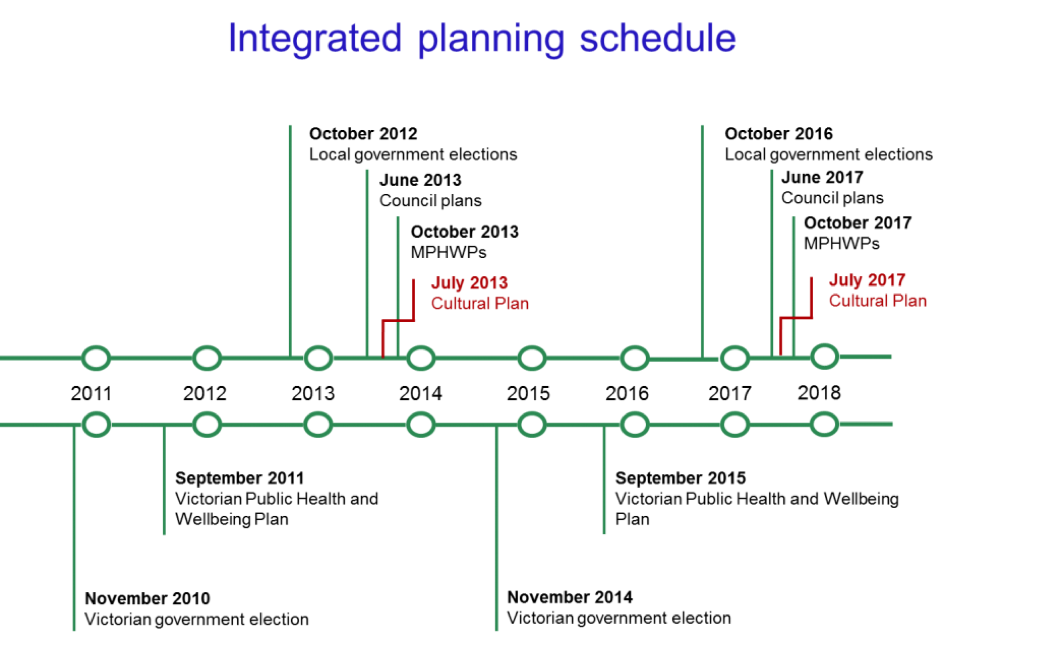We recommend that Cultural Development Plans are created and executed in synch with the regular planning cycle for the LGA, for the most effective work and greatest chance of integration with the activities of other areas of council. This will ensure that activities of Cultural Development departments are better valued, understood and prioritised equally with other areas of activity.
Council elections occur in a regular cycle (which in Victoria is every four years) after which a new Council Plan is developed. Councils’ community consultation usually happens at the time of council elections, with councils charged to understand the desired future of their communities and represent this in their plans. Cultural development planners therefore should pay attention to the findings of council’s consultations as represented in Council Plans, and respond to those in their Cultural Development Plans.
This Framework enables a relatively efficient and speedy process, to enable new Cultural Development Plans to be developed and in action within months of the publication of the Council Plan.
The following schema is recommended as an ideal timeline for integrated planning, with Cultural Development Plans being timed to match overall council planning cycles. Figure 1 below shows an example from Victoria of the timing of council elections, production of Council Plans, and other plans including Municipal Public Heath and Wellbeing Plans, and the Cultural Development Plan.

Figure 1: Sample integrated planning schedule for Victorian councils
Who Should be involved in writing a Cultural Development Plan?
The Framework for Cultural Development Planning has been created to enable council officers to write their own plans, without needing to outsource the task to consultants. This planning is not something that can be effectively delegated externally – no one is in a better position to determine the local community’s desired future than locally based staff. The resources on this website, as well as CDN’s regular professional development events, are offered to equip councils’ cultural development staff to undertake this process themselves effectively, ensuring best use of council resources, including their own time and skills.
Previously the support of consultants has been important because there was no framework or shared practice around which councils could shape their work: each plan was a blank page that needed to be written from scratch. The Framework offers a model for constructing a plan that will support the most inexperienced teams and planners to undertake it themselves.
Benefits of writing the plan internally
The most compelling reason to write cultural plans internally is the practice expertise of council staff. Council staff’s knowledge of their professional field, their community, the council and its resources should not be underestimated. All of these are valuable assets in helping determine goals, objectives and appropriate activities in the plan. Other benefits of undertaking a plan internally include increased ownership of the finished document, the opportunity to benefit from knowledge and skills of other council officers, a plan that responds to community needs and desires rather than a generic product and the long term benefits in training officers in strategic planning practices. A final impetus it the fact that an analysis of cultural plan of Victorian councils (CDN, 2015) demonstrated no difference in quality of plans produced by council staff than consultants.
Using consultants
We recommend that if a council makes the choice to employ consultants, the following division of tasks is used:
- Steps 1, 2 and 3: Identifying values, considering goals and setting objectives are determined by council staff, informed by the Council Plan.
- Steps 4, 5 and 6: Getting informed by evidence, establishing a theory of change and being respondent to evaluation can be assisted by consultants
Choosing consultants:
Consultants should be selected for their expertise in evidence-based work, especially experience in arts and local government. Their work should be directly responsive to Values, Goals and Objectives established by council. Consultants should be asked to use this Framework and be selected on that basis.
Other contributors: Cultural Development Advisory Group
Many councils establish an Advisory Group of local residents and experts to support the planning and execution of council’s cultural development activities. The input of local stakeholders has been demonstrated as beneficial, including increased buy-in of communities in council’s work, improved outcomes for communities (Phillips, 2004) and greater sustainability.
References:
Dunphy, K. & Yazgin, L. (2015) Analysis of Victorian local government cultural development plans. Melbourne: Cultural Development Network
Phillips, R. (2004) Artful business: using the arts for community economic development. Community Development Journal, 39(2), 113-120

